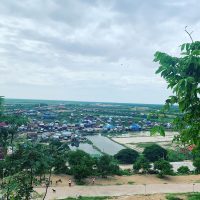| GRIFFITH GLEANINGS OCTOBER 2018
October has always been a significant month in our family. Unlike our Khmer friends, we come from a culture that celebrates birthdays. Both of Rob’s parents and our two daughters have birthdays this month. Rob’s Dad turns 88 and our youngest child Miriam turns 21. Being separated from family for significant dates like a 21st birthday celebration brings to mind some of the costs that are traded to be here in Cambodia. The cost to our children and all of us. Family is hugely important in Cambodia. Rarely will we meet a person for the first time that we are not asked about our children, where they live and whether they have visited us here. We will have a few sad thoughts this month at times, but Mim did share that one consolation was that we will not be embarrassing her with one of our speeches!
Have you ever had a conversation with someone with bright red saliva oozing from their mouth? Deb values any opportunity to share with the Khmer grandmother figures; in Khmer called ‘Yeay’. Most of them endorse the monthly spiritual practice of shaving their head. They have much wisdom, insight and stories. Deb feels honoured to sit with them and practice being present among the cultural differences around her during these interactions. One aspect that is common among many Khmer elderly women is they gnaw betel nut or tuck it under their upper lip making communication for a language learner very tricky. Now betel nut is actually not a beetle or a nut. The folded leaf comes from the betel plant ‘mlu’ in Khmer, a vine that looks a little like ivy. But the hard part, the “nut,” comes from a different plant altogether, the areca tree, a spindly palm that looks like it has bunches of green and orange grapes hanging in place of coconuts. These fruits can be eaten fresh or dried in the sun to reach the consistency of a nut. But it is only when combined with betel leaves smeared with limestone paste that it produces those signature streams of scarlet saliva which is spat out into the ground next to them and sometimes on their hands, shirt and sprayed during talking. Deb admits to an odd wave of nauseousness but feels grateful being with the elders.
Some older Khmer women continue to chew while most Khmer have given up the practice. Most of the Yeay’s have very few teeth left and may have blackened nubs that are a sign of serious chewers. Whilst a few Yeay’s told me that mlu would make my teeth stronger and improve my breath, one Yeay sharing that her ten bundles of betel per day helped her to relax and forget her worries. I know that areca has a mild narcotic effect, the Yeay’s confirm they may feel a lightheaded dreaminess. This effect, one Grandma explained, was why it is always good to offer a neighbour some betel if they happen to be angry with you.However the Yeay’s strongest reasons for chewing betel have to do with attachments to a culture that is not our own. At a Khmer wedding, the groom will offer betel to the parents as a sign of love and loyalty. Most of the Yeay’s show me their inherited seemingly hundred-year-old betel cutters a way to pass on the practice to other generations.
Is it compost or is it rubbish? Many of the vegetable farmers in the village where we live are well experienced in recycling manure and some waste products to use as fertiliser, but at the Chreav school one of the challenges for Rob has been getting the message across that there is a difference between products that need to be separated from plant material to create mulch. It is a common practice at the school and around most country homes to sweep away every item that lands on the surface of the soil. All of this ‘rubbish’ (tree leaves, plastic food wrapping, polystyrene foam, drinking straws, etc) may find its way into the nearest waterway, or be swept into a pile and burnt. Mostly the school garden compost bins require painstaking separation and removal of plastics from the layers of ‘sweepings’ after they have been added. They say that ‘one mans trash is another mans treasure’. Possibly some deep cultural insights will be gained before the multiple instruction of children and signs on bins has the desired effects. |





































